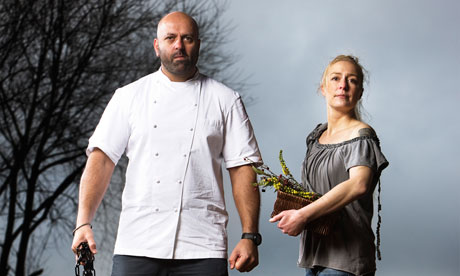
She's our little foraging pixie," says chef Sat Bains of 33-year-old Dane Nanna Vestergaard. He's not being patronising. Most people look small to the huge, 39-year-old Midlander, whose shaven head and Bluto from Popeye physique is in direct contrast to the finesse of the cooking at his eponymous Michelin-starred restaurant in Nottingham. Vestergaard might be a smiley, petite blonde with elfin features, but she's also Bains's secret weapon.
She was hired as Bain's development chef after arriving for her interview in May last year clutching armfuls of plants and herbs collected from the surrounding area, including Jack by the hedge, elderflowers and ground elder. The haul was put to use in her trial dishes, and a wowed Bains employed her on the spot. "When she showed up with all those herbs I thought, 'bloody hell,'" he says, flashing a Cheshire Cat grin.
At the time Bains was converting his outhouse office into a development kitchen, somewhere away from the pressures of the restaurant where his team could experiment. "We knew there were certain things around like wild turnips, elderberries and blackberries," he says as we walk through the restaurant garden to the new kitchen. "But she brought a trained eye to the programme." It was Vestegaard's encyclopaedic knowledge of wild food that sealed the deal: Bains's ambition is to develop "an evolved cuisine based around nature, and Nanna is the perfect person for that".
Since the rise of fellow Danish chef René Redzepi's two-Michelin-starred restaurant Noma in Copenhagen (where fiercely regional, native ingredients are used to fantastic effect) the use of wild foods on restaurant menus is increasingly common. While Bains insists his food hasn't actually "gone foraged", he's no stranger to this new culinary zeitgeist, having worked with Redzepi when they were both young chefs at Le Jardin des Sens in Montpellier in the south of France. He also sent one of his former sous chefs, Ben Greeno, to help with the opening of Noma in 2003.
Vestergaard has brought Bains's cooking closer to its immediate environment. She quickly identified around 70 different species of edible flower, herbs and vegetation on the nearby banks of the river Trent, which turned the restaurant's rather incongruous location – under a pylon, next to a flyover in an industrial estate – on its head. Together Bains and Vestergaard have developed a new dish made solely from foraged elements and named it after the restaurant's postcode, NG7 2SA. "You're basically tasting the lane in this dish," says Vestergaard, who has a degree in classical philology from the University of Copenhagen but pursued cooking after stints in kitchens as a student. "When you go down the lane there are hazelnuts everywhere, crab apples and chickweed."
NG7 2SA combines hazelnut powder, which is dry until it melts in the mouth, with acidic blackberry vinegar and a sweet slick of crab apple puree. A golden croquette oozing with creamy wild horseradish emulsion gives depth while caper berries provide a floral piquancy. An abstract but perfectly balanced dish, it will also evolve with the seasons.
And most importantly for Bains, it's indigenous, although Vestergaard has also introduced some traditions from her homeland, such as pickling and preserving, especially the pickling of elderberries as capers. "When the elderflowers have started to berry they go green," says Bains as Vestergaard presents me with one of their creations – a savoury play on the Danish donut Æbleskiver, a dumpling filled with cabbage, bacon and pheasant sausage on a puree of sweet onion and kombu seaweed. "We pick them at that stage, salt them, wash them, and pickle them in brine – but they sometimes have this beautiful elderflower note that is really fruity."
Later I walk with Vestergaard in the lane, and she shows me wild horseradish growing in the hedgerows. We pass yet another pylon, and while to the untrained eye this landscape could seem bleak, Vestergaard is in her element. "When you dig these up you're going to have the strongest horseradish ever," she says as she tugs at the green tops of the roots. "You can't buy anything that's got flavour like these plants. As soon as you open your eyes and see them, they're everywhere. "
Restaurant Sat Bains, Lenton Lane, Nottingham, 0115 9866 566, restaurantsatbains.com. The development kitchen is open for lunches and demonstrations.

